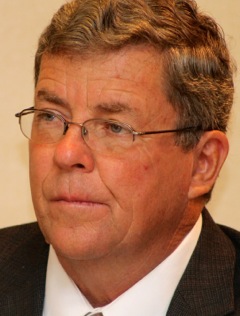Should Riverhead join a regional effort to ban the use of plastic bags by retailers throughout the five East End towns?
That question may soon be put to the public by a split Riverhead Town Board, where three members support at least holding a public hearing on the proposed ban.
The initiative to ban single-use plastic bags in the East End towns was announced by the Southampton Supervisor Anna Throne-Holst last week. In a press release, Throne-Holst said there would be “a coordinated effort among East End towns and villages to consider implementing a regional ban of single-use plastic bags by Earth Day — March 22 — 2015.
The villages of East Hampton and Southampton have already banned the use of the plastic film bags. The towns of Southampton, East Hampton, and Riverhead, along with the villages of Sag Harbor, Sagaponack, North Haven, West Hampton Dunes and Quogue are considering adopting such a ban, Throne-Holst said in the press release, issued Wednesday.

In Riverhead, only councilmen John Dunleavy and James Wooten are currently in favor of the ban. Councilwoman Jodi Giglio is undecided and supports holding a public hearing on the question. Supervisor Sean Walter and Councilman George Gabrielsen oppose the ban as well as holding a public hearing on the initiative.
In Southold, the town board is not taking any action, according to Supervisor Scott Russell. Southold may revisit the issue if other towns participate, he said.
“There appears to be some support of a countywide ban and I believe the board will pass a resolution urging adoption of a ban at the county level,” Russell said.
Walter argues that a plastic bag ban is something that should be undertaken at the county or even the state level of government.
In fact, Suffolk County became the first municipality in the nation to adopt a plastic bag ban in 1988. (The law, written by then-legislator Steve Englebright, also banned the use of many other plastic packaging, including foam takeout cups and containers.) After three years of litigation brought by the plastics industry, in which the county successfully defended the landmark law, a new Republican-Conservative majority in the County Legislature in 1992 approved a moratorium on the ban. That move effectively scuttled the Englebright measure. The county later required most retailers who use single-use grocery bags to provide on-site containers for consumers to deposit them for recycling.
At last week’s work session, Walter told Southampton Town Sustainability Committee co-chairman Dieter Von Lehsten, who went to the Riverhead Town Board work session to discuss the matter, that he’d only support a regional ban by the East End towns and villages if the municipalities agreed to create a legal defense fund to back it up.

“With all the national retailers we have in Riverhead, I guarantee you this will get their attention and the Town of Riverhead will be sued. Defending a lawsuit like that could easily cost the town a couple of hundred thousand dollars,” Walter said afterward.
Gabrielsen is opposed to any ban, which he said is bad for farmers, who rely on plastic bags at their retail farm stand operations. Paper bags don’t work well for fresh produce, which is often wet, he said. They are also more expensive to produce and to buy.
Von Lehsten said the objective of the proposed ban is to have consumers switch to reusable bags, not to replace single-use plastic bags with single-use paper bags.

But Gabrielsen said reusable bags have a downside too. People don’t clean them properly and a study showed 8 percent are contaminated with E coli bacteria, the councilman said.
A 2011 study by scientists at the University of Arizona and Loma Linda University found bacteria in 99 percent of the reusable grocery bags randomly tested at grocery stores in California and Arizona. They also found half of the bags carried coliform bacteria, including, in 8 percent of the bags, E. coli.
The Arizona-Loma Linda study, released as the State of California was considering a plastic bag ban, was funded by the American Chemistry Council, an industry lobbying group that represents, among others, plastics manufacturers, according to the Los Angeles Times.
The researchers found that only 3 percent of shoppers using reusable bags reported regularly washing them, which will reduce the bacteria by more than 99.9 percent, according to the report. The report recommended that the public be educated about the proper care of reusable bags by printed instructions on the bags or through public service announcements.
 According to the Southampton supervisor’s press release, 104 billion single-use plastic checkout bags (700,000 tons) were used in the United States in 2012. Only 50,000 tons, or 7.1 percent, were recovered through recycling or reuse, according to the release. More than 96 billion bags (650,000 tons) end up in landfills, incinerators, as litter, or in local waters every year, the Southampton supervisor said.
According to the Southampton supervisor’s press release, 104 billion single-use plastic checkout bags (700,000 tons) were used in the United States in 2012. Only 50,000 tons, or 7.1 percent, were recovered through recycling or reuse, according to the release. More than 96 billion bags (650,000 tons) end up in landfills, incinerators, as litter, or in local waters every year, the Southampton supervisor said.
More than 130 cities and counties have passed plastic bag regulations in some form, Throne-Holst said.
It was not immediately clear when Riverhead would schedule a public hearing on a proposed ban.
““I’ve been working on this for a year,” Councilman John Dunleavy said in the press release issued by Throne-Holst. “The ban is workable and will be beneficial to the environment. I believe it should be passed, and I’m eager to hear the public’s opinion.”
The survival of local journalism depends on your support.
We are a small family-owned operation. You rely on us to stay informed, and we depend on you to make our work possible. Just a few dollars can help us continue to bring this important service to our community.
Support RiverheadLOCAL today.































